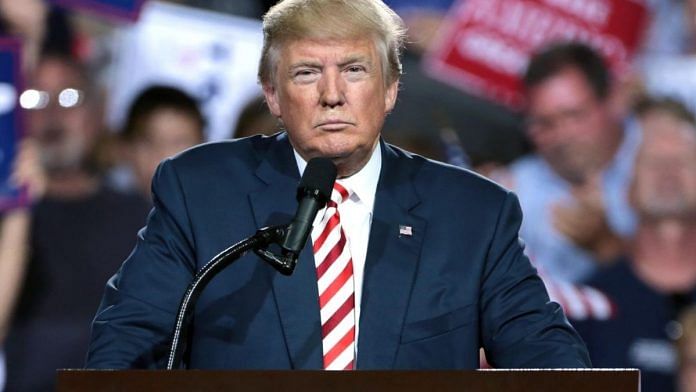New Delhi: US President Donald Trump paid just $750 in federal income taxes the year he won the presidential election in 2016, and another $750 in his first year as president, The New York Times reported Sunday.
Trump’s tax return data for the past two decades, which was accessed by NYT, revealed that the president had not paid any income tax for 10 of the past 15 years, “largely because he reported losing much more money than he made”.
For years, Trump has refused to disclose his tax returns, arguing that he is under audit by the Internal Revenue Services (IRS) — the tax regulatory body in the US. However, there is no actual legal restriction in the US preventing those being audited by the IRS from releasing tax returns.
But there is also no law in the US that compels presidential candidates or even the president to go public with their tax returns as they are protected by the constitutional right to privacy.
ThePrint looks into the controversy regarding tax returns by US presidents.
Do voters need to know about tax returns?
Tax returns reveal much about a candidate including, but not limited to, their assets, credits, liabilities and expenditure, ensuring that the candidates bear no conflict of interest if they are to enter office.
Unlike general financial information, personal income tax returns provide insight into taxes paid by a candidate and the rate at which it was paid, deductions and credits claimed, charitable donations, debts claimed, offshore assets and more.
It primarily indicates if a candidate has been a law-abiding taxpayer and if there has been any tax evasion in the past.
Also read: Hackers can slow US presidential poll voting and counting, not stop it
Trump is breaking no law by not disclosing tax returns
However, Trump is not breaking any law by not disclosing his tax returns.
Presidential candidates are legally bound to file a ‘Personal Financial Disclosure’ with the Federal Election Commission, which includes investments, revenue and income from different sources.
In 2016, before the presidential elections, Trump filed a 104-page personal financial disclosure, which highlighted that his net worth was over $10 billion.
However, unlike a tax return, this form does not show a person’s annual income and, according to US-based law firm Reeves Law Group, “is not sworn to be accurate under penalty of perjury”.
The IRS’ internal guidelines also mandate an annual and automatic audit of returns filed by the incumbent president and vice president.
However, since tax returns are protected by a strong constitutional right to privacy, there is no legal obligation for candidates or sitting presidents to publicly disclose Form 1040 — the IRS tax form used for personal federal income tax returns.
Also read: Joe Biden maintains 10% point lead over Donald Trump in Washington Post-ABC poll
But Trump is going against custom
Despite there being no legal obligation, Trump, both as candidate and president, broke a 47-year-old custom among US presidents of voluntarily releasing tax returns.
The custom began in 1973, when former president Richard Nixon went public with his tax returns amid a controversy over his personal taxes, which were under audit at the time.
He told reporters that year: “People have got to know whether or not their president is a crook..Well, I am not a crook.”
Since then, all presidents have released their tax returns, except for Gerald Ford who disclosed a summary data of his federal taxes.
Then again, not all candidates release their tax returns uniformly. Some candidates have released decades’ worth of returns while others release just a part or summaries of their documents.
For instance, in 2012, then Republican presidential nominee Senator Mitt Romney received flak for releasing only two years of tax returns. In comparison, Republican leader Jeb Bush released 33 years of tax records in 2015.
The tax returns of candidates’ spouses have also been a bone of contention. In 2004, Democratic Senator John Kerry released 20 years of tax returns but ran into trouble when he refused to file returns of his wife, Teresa Heinz, who was said to have a net worth of over $500 million at the time.
However, in recent years, there has been a call to make it legally mandatory for presidential candidates to release their tax information.
Last year, a US-based non-profit organisation Citizens for Responsibility and Ethics in Washington (CREW) pushed for more transparency by calling all 2020 candidates to disclose 10 years of tax returns.
There is also a Presidential Tax Transparency Act, proposed by Senator Finance Committee Ranking Member Ron Wyden in 2016, which seeks to make it mandatory for presidential nominees to release three years of recent tax returns.
Political candidates in India
In India, candidates contesting elections whether assembly or general, are mandatorily required to disclose their assets, liabilities and income tax return information for the five years preceding the election year, under the Conduct of Elections Rules, 1961.
While this was a continuing trend, the Supreme Court, in 2012, declared tax returns as personal information that stands exempted from disclosure under the RTI Act, unless compelled by larger public interest.
But this changed in 2018 when the top court allowed more access to information in affidavits filed by candidates.
Form 26, or the poll affidavit, now makes it mandatory for candidates to declare the total income of the past five years earned by them, their spouse, the ‘Hindu Undivided Family’ (HUF) of which they are the head, and their dependents.
Also read: Why Biden has the upper hand over Trump in expectations game for tomorrow’s debate




If you believe this…you are seriously ignorant…. Show proof….it is really really disappointing how people say anything and its just believed